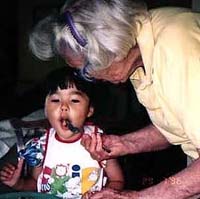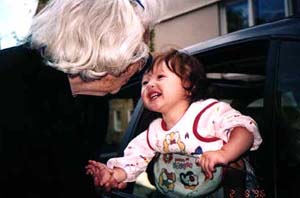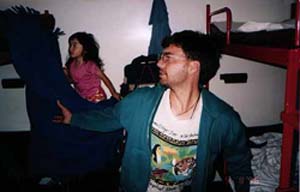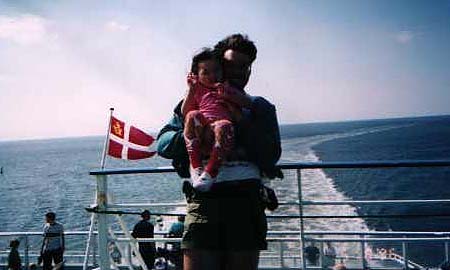
www.debito.org
THE EUROPEAN TREK PART DEUX
(Originally sent to Friends on Fri, 13 Sep 1996)
Alright, the rest of England.
One resident of Stamford--ALDWONKER
My grandmother, Kathleen Aldwinckle (aka "Aldwonker"), is a prime example of the best of British. At age 92, she was born just after Queen Victoria (Remember her? Nor do I.) died, and her education and values, to me anyway, reflect a lot of that era. A governess and teacher, she believes that good schooling, breeding, and training are the keys to success for well-to-do people.

"A person should speak with an accent which doesn't indicate from whence they came," she said a number of times. That was fine in theory. Then she started to correct my American pronunciation of "bath" when I spoke to Amy: "Not Bahth. Bawth. Dear boy, or else they can tell where you came from." The governess in her.
I thought about countering her with the facts that 1) her accent itself indicates that she comes from England, and 2) her demands that I speak Queen's English is like telling an Afrikaner to speak Dutch. But poor Ald wasn't in a state for debates.
Ald is losing her ears and eyes. She is pretty blind now; she's been mostly deaf for as long as I've known her (at age six I was shouting without reprisal, and it had an effect on my life. Nobody else could speak with such volume--drowning out spotty, randy, and rambunctious kids--in Boy Scouts. Even today I never use a mike when teaching in an auditorium). Said of her blindness: "It's as if there's a mist everywhere." That means she can't really read, can't watch telly, can't do the things that an active mind needs to stay awake.
Still, she's very upbeat about it all. To quote her, "There's nothing wrong with me, dear boy. I'm just blind and deaf."
The point of all this description of aging is that I realized something about my own mortality. Part of childhood is believing that old and grey people have always been that way, and disbelieving their marriage photos on the mantle. Then adolescents believe that they'll reach puberty and retain their physique forever. Then I come back and see my friends in Europe after a ten-year absence.
Ten years is a long time on the calendar for anyone. My friends, once twenty, are at thirty years becoming aged (like those fancy "Aging Face Software" programs one sees in crime-solving TV programs) with lines, broader hips and guts, and severely-receeding hairlines. Even their NOSES have changed--my old French girlfriend Monique had a newly-aquiline nose, my Spanish friend had lost her mother's Greek flat-profile nose and started taking her father's bulbous WC Fields'. My friends that passed into their fifties had changed the most--they had lost their chins, gained whorls and eddies around the eyes, as well as girth around the waist, and looked almost exactly like the photos of their parents. Ald herself, who has always been old and grey to me, was really unchanged, except that the aging process was now reaching in much deeper--she was slower with her mind wandering at times. It was informative, and I realized that I was not immune. I looked in the mirror and extrapolated where my aging software was going to hit next.
Anyway, back to Ald. I realized that she was doing her best to be nice to the children, her first great-grandchildren, but they were too young for her and she too old for them. Amy and Anna soon made a mess of everything in her tidy and orderly apartment (in which she is unable to bend down and clean, nor able to see if there was anything--or anyone--in the way). She tried to feed Amy and ended up putting the spoon in her eye.

As well as trying to be nice, in her way, to me. She was full of advice on child-rearing. The most memorable bit was the necessity "to put the children on a schedule".
"Give them a routine. Meals at this time, sleep at this time. Discipline is what the children need." Fine, I thought.
"And I think you're doing the wrong thing by taking them around Europe." Oh oh.
"I would never have done that with my children! It's not good for them. There's no routine. And who knows what's out there?"
I sighed. "The 'Wogs begin at Calais" ideology. I tried to tell her that she didn't need to worry. This is Europe, modern, finally at peace, and in places even richer than Britain. Trains all around were clean, efficient, and crime-free (although we'd find out that wasn't entirely true later). We would be staying with friends nearly everywhere. The only place we might have a problem would be Serbia, but there we'd be staying with a US govt official.
But Ald simply couldn't understand. She shook her head. Not in her day.
Later, my English cousin Binny, with a child of her own, told me more about how
children were raised in England in Ald's day. Wake the newborn child up at 7am and
feed it. Then put it in a barn alone in a crib and don't touch it until noon (let
it cry itself to sleep). Then wake it for it's next feeding time. Then again it's
a barn or something like that until the evening meal. Get the baby used to a feeding
schedule, a sleeping schedule, etc. Oh, and remember that a nanny looks after the
baby, not the mother. A professional would do a better job of humanizing the child.

Not in our day, said Binny, breastfeeding in Yorkshire. For Amy, at 2 years and nine months, and Anna, exactly one year, she concurred that this Europe trip would be a wonderful experience. Who cares if they didn't really remember it? What will happen is that they will be more open-minded, prepared for changes in routine, and internationalized--aware that other ways of doing things and expressing oneself exist. Which is precisely what Aya's and my children, products of two often diametrically-opposing cultures, need.
I told Ald conclusively that the children were ours and products of our cultures and generation. We don't have a road map, but we're doing our best with the childrearing.
She sighed, sat back in her chair, and said no more. That is what makes Ald so great--her ability to speak her mind, ever charmingly and forcefully, but to accept the decisions of others without animosity. Best of British indeed.
The bottom line is that the effects of the years are not only seen in the face, but also in the mind.
DENMARK

We bid goodbye to Ald and headed off to the Continent.
Boarding a rather expensive ferry ($250 total for two berths, kids free, in a four-berth cheapo bunkbed cabin with curtain separating us from some extremely tall and noisy Danish schoolboys) operated by the Danes between Harwich and Esjberg, we left behind our rental car and my native language and headed for my first trip to Scandinavia.

My Uncle Bill put it well: "Danish people like things 'just-so'."
It felt true. The trains were clean and had free little blue plastic bags on the walls for people to take off and put their garbage into. (We borrowed several, which served us on our entire trip.) Things were on time and schedulable. Buildings were clean just about everywhere you looked and most places (in the charming Svendborg area, granted) looked picture-postcard. The downside was that heavy taxes made things a bit expensive (esp automobiles--making used cars a precious commodity), and strong Protestant roots made churches look rather Spartan (Danish moldings were painted on relatively bare walls, whereas they are attached, 3-D, in the luxurious Italian and Bavarian churches.) The whole nation looked very Viking: people were tall and brawny and blond, and ship imagery was everywhere. It was the shippers and merchants who built those churches and still keep Denmark rich today; Denmark has trade surpluses with the countries that matter, and Danish companies can be found in really far-flung places getting their trade lines up before the big boys get there. And of course, famously, Denmark resists the European Union, giving it their first veto in a referendum. They got where they are today through their own perseverence and terms of trade, and aren't going to stomach oddball Europeans in Brussels telling them what their rules ought to be.
"Just-so" indeed.
Our hosts, Per and Lisa, put us up (or put up with us, shall we say) despite being
very pregnant (Lisa was a month away from bursting) and no house. Living with Lisa's
parents, they were searching for months for a new abode (so we could stay with them),
but alas;  some places they'd spied were snatched up in, literally, twenty minutes.
So they found us a rented cabin by the sea. The Danish sea, that is, which hooks
up with the Baltic and is too cold for us. Not to mention full of jellyfish--avoid
the red ones, with the tentacles descending underneath, cos they can sting you to
death. But hey, guys, pay no attention and have a swim. Like everyone else around
here.
some places they'd spied were snatched up in, literally, twenty minutes.
So they found us a rented cabin by the sea. The Danish sea, that is, which hooks
up with the Baltic and is too cold for us. Not to mention full of jellyfish--avoid
the red ones, with the tentacles descending underneath, cos they can sting you to
death. But hey, guys, pay no attention and have a swim. Like everyone else around
here.
A cabin by the sea just for us was a major feat for Per and Lisa to arrange. Svendborg, the San Diego of Denmark, was in early August at peak season, full of holidaymakers sitting in their mobile homes doing nothing for a week or two, watching TV behind their wind-blocking cloths. Cold? Hey, it's 20 degrees C outside--a veritable heatwave, and people smiled at us in their swimtrunks while we stood there shivering. We began to understand the Scandinavian mindset about summer--no matter how chilly it may seem, this is all the time there is for summer and it better be spend outdoors gloriously. We tried to get into the spirit, but ended up missing the real San Diego.
A couple more notes in passing:
People in Denmark spoke English surprisingly often and, moreover, comprehensibly--without the bouncy Swedish intonation or the rough Schwartzeneggeresque Teutonic gruffness. Aya, who was having trouble rewiring her brain to understand British English (due to an American husband), found that she could communicate far better here.
And a quick trip to Copenhagen, the "Cultural Capital of Europe 1996", was worth it just for the train ride there. We wanted a night train down to Germany so we could stop in Koln before going on to Paris. The night trains depart from Copenhagen. But Denmark is a collection of islands, and Svendborg is on an island between Jutland and the island that has Copenhagen. As the crow flies, it's only a coupla hundred kms, so one wonders why it takes about three and a half hours. The reason is simple--we're talking as the crow flies; not all of the islands have bridges across them.
Ah well, bring a book and board the train. So here we are coasting through nice but nondramatic Danish countryside when suddenly the train gets swallowed by a tunnel and stops in the middle. Then the doors open. Hey--the train has actually BOARDED a ferry. Now we could go up top and eat, walk around on deck, and let the kids do what they wanted in the play-area for the hour boatride.

Then as you pull into port, you realize that you didn't see what car your seats were in , and the trains are put inside the boat symmetrically, like two sausages in a convex gunbarrel. Hurry, look in every window and find your luggage (while the conductor looks at you as if to say, "another bunch of tourists holding up the schedule..."), and enjoy the home stretch to Copenhagen. We stayed in the city a total of five hours, which was enough to catch a number of buildings (which look definitely Scandinavian or Eastern-bloc) in the long, flat, Scandinavian sunset. Then we caught the night train south to further adventures.
Sorry, no "Tapestry"-style tale this time, where Dave hits obstacles, runs around, and arrives at a happy end after either he explodes or gets lucky. Things were smooth in Denmark, thanks to our hosts. Makes for more meandering travelogue, but with two kids in tow that suited us just fine.
Everything was, truly, "just-so".
Germany and France next.
Dave Aldwinckle
Sapporo
(on to the next essay in the series)